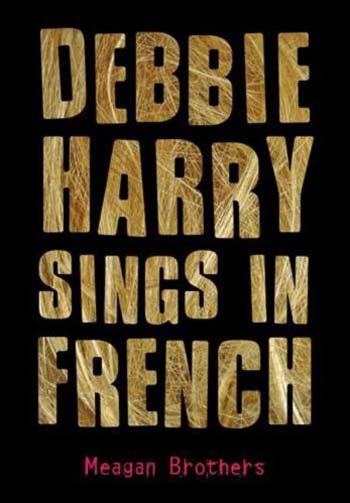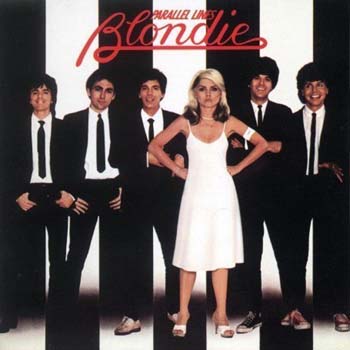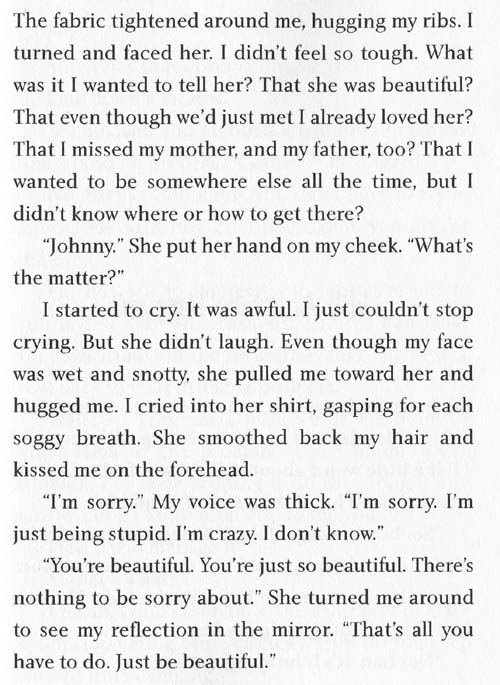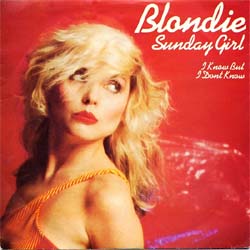YA Co-Review: Debbie Harry Sings in French
 May 27th, 2008 by Eisha and Jules
May 27th, 2008 by Eisha and Jules
 Jules: Last week we talked gender politics and feminism à la E. Lockhart. This week it’s gender and sexuality and identity, issues deftly explored in the debut novel from Meagan Brothers, a Pushcart-Prize-nominated poet who, according to her bio, has made a name for herself in New York City’s spoken-word scene.
Jules: Last week we talked gender politics and feminism à la E. Lockhart. This week it’s gender and sexuality and identity, issues deftly explored in the debut novel from Meagan Brothers, a Pushcart-Prize-nominated poet who, according to her bio, has made a name for herself in New York City’s spoken-word scene.
Apparently, this first novel of Brothers’, Debbie Harry Sings in French, is being released today (Henry Holt); Eisha and I shared an ARC of this title, which is why we’re able to tell you about it now (and the fact that we’re telling you about it on its very release day is a stroke of luck. We’re not normally this organized.) And, for the record, quoted excerpts in this post are subject to change, since we read an advance copy. Oh and also: As always, some plot spoilers are included below.
Brothers tells the story of sixteen-year-old Johnny. His father is dead, and his mother—as a result—descended into a depression she’s only now stepping out of when the novel opens. Johnny is picked on at his high school in Florida for wearing eyeliner and being all-around left-of-center, and he mostly hangs with his best friend, Terry. Eventually, Johnny ends up in rehab for alcoholism after his very own near-death experience (which impacts him — “some of the other Goth kids I knew were always talking about death in a weird, detached kind of way. It was like they wanted a zombie-movie version of it, not the real, messy, emergency-room version. I thought like that, too, for a while. But something changed, and I couldn’t think that way anymore.”)
Johnny’s mother sends him to live with his paternal uncle and his daughter (“Bug”) in South Carolina. It’s there that Johnny meets Maria. And Reading Rants put it so well that I must quote them here:
 “It’s Love and Rockets at first sight, except for the troubling fact that Maria initially thought Johnny was gay. Why? Just because he likes to Robert-Smith-it up a little? Johnny knows he’s not gay, or he wouldn’t dig Maria so much. But what do you call it when you like girls, but you secretly want to try on that little white dress from the thrift store that looks exactly like the one Debbie Harry wears on the cover of Parallel Lines?”
“It’s Love and Rockets at first sight, except for the troubling fact that Maria initially thought Johnny was gay. Why? Just because he likes to Robert-Smith-it up a little? Johnny knows he’s not gay, or he wouldn’t dig Maria so much. But what do you call it when you like girls, but you secretly want to try on that little white dress from the thrift store that looks exactly like the one Debbie Harry wears on the cover of Parallel Lines?”
I’m sorry, but that “Love and Rockets at first sight” bit made me happy. I used to be a fan when I myself was in high school.
So, right. Focus, Julie . . . Johnny falls for Maria and also falls hard for Blondie’s music (“Listening to Debbie Harry sing the French part of ‘Sunday Girl’ was somehow more reassuring than anything the counselors had told me so far”) — and Blondie’s “tough, but…really beautiful” stage presence. “It’s not like I just think of Debbie and, bang, I’m cured,” he tells his guidance counselor at school. “It’s . . . I dunno, meditation or something. If I’m in tough situation, I think about how cool and tough she is, and I try to be cool and tough, too.” Finding strength in that persona and how her music makes him feel, he eventually takes it a step further by dressing as her and, ultimately, entering a drag show. He also learns more about his father than he ever knew before while staying at his uncle’s.
So, what’d you think, Eisha? I was really wow’ed by this one, and if this is Brothers’ first book, I can’t wait to see what she does next. I’m probably getting ahead of myself, but there was one part of this book that I thought was so beautiful, I had to put the book down and just savor it for a moment. A great read overall, I thought. What about you?
eisha: I liked it. I don’t think I loved it as much as you, but I definitely liked it.
I loved that it was an original take on teen sexual identity experimentation – that’s getting really hard to find. The back cover copy says it best: it “introduces shades of gray into the black-and-white ideas of sexuality and gender.” I also liked that, for a book that is so chock-full of the kind of issues that YA lit thrives on – sexual identity, death of a parent, substance-addicted teens, substance-addicted parents, etc. – the novel never got too weighed down. There was a good balance between dark introspection, tense confrontation scenes and humor. Johnny is a likable protagonist, and his sharp, wry observations of the dumb-jock types who torment him at school and the bumbling adults who don’t quite know how to help him are dead-on.
If there’s a flaw I can point out, it’s that the beginning was kind of slow. I’m not sure we needed that much exposition, or to spend that much time with Johnny and his friends in his goth phase. The progression from Debbie Harry fan to Debbie Harry impersonator seemed sudden in comparison.
Okay, your turn. Why did you love this book, and what part made you have to put it down before you swooned?
Jules: I really loved the end of the chapter in which he had just—for the first time—dressed up as Debbie. He’s standing there with Maria and has just slipped the dress over his head (I totally have an image of this excerpt, since I sent my ARC to you but had scanned my favorite parts before I sent it. And this is too long to re-type. I hope I’m not breaking any copyright laws here):

End of chapter. Love that.
I also love the entire premise — that a teen can find confidence in the persona and music of a singer/songwriter musician. I mean, didn’t you look at that one artist (or a band perhaps)—when you were a teen—whose lyrics, or even image, you could identify with and feel rather empowered? I did. “If I’m in a tough situation,” John told his counselor at school, “I think about how cool and tough she is, and I try to be cool and tough, too.” And the empowerment he felt at the drag show. I didn’t exactly enter drag shows in high school, but that idea of feeling empowered by the creative work—and even the stage persona—of a musician all made sense to me. It’s similar to when Johnny tells Bug—when she’s nervous about her Sally Ride role for the school play—to “just rely on the same things Sally Ride would. Bravery. Intelligence. All the things in your speech.”
Anyway, yeah, word to what you said about how the book is a refreshing look at sexual identity and gender. I mean, he wasn’t gay and didn’t think he was a transvestite (“Sometimes I wish I could be gentle and beautiful,” he tells his guidance counselor at school, “and not be called a queer”). The book really takes people’s preconceptions about cross-dressing and stands them on their heads. And I don’t know that I found the beginning that slow. I thought it was necessary to understand why he did what he did — the alienation he felt (“Terry was my best friend, and it was like all of a sudden we were speaking two different languages”), caused by all the crap going on for him, was, in part, what drove him toward a new identity. I think if I hadn’t had all that, I would have perhaps found impersonation too, I dunno, contrived or too implausible.
I have what is probably a very dumb-ass question: I am not terribly familiar with Debbie Harry’s music. I wondered if each chapter was based on a song title of hers?? I assumed so and was going to look that up, but then—like I said—I sent my copy to you. Is that what Brothers did — a Blondie song title for each chapter?
eisha: Yup, that’s what she did. At least I think so, based on my own limited Blondie knowledge, which stems from having the Best of Blondie record (yeah, vinyl and everything) as a kid. I did recognize several titles.
 Fair point about needing the exposition to set up the transformation. Or maybe the odd pacing is in reference to the Blondie lyrics from “Sunday Girl” he keeps quoting: “Depeches-toi, depeches-toi et attends.” I think that means “Hurry up, hurry up and wait.”
Fair point about needing the exposition to set up the transformation. Or maybe the odd pacing is in reference to the Blondie lyrics from “Sunday Girl” he keeps quoting: “Depeches-toi, depeches-toi et attends.” I think that means “Hurry up, hurry up and wait.”
And you’re right, too, that defining ourselves through allegience to a particular band or singer is something a lot of us do in high school when we’re forging our identies. I think – based on observation and personal experience, not scientific study or anything – that it’s particularly true of those teens who aren’t in the top tier of popularity, or aren’t members of a sanctioned tribe like sports or the marching band or the debate team or whatever.
Speaking of, I knew a girl in high school who idolized Michael Hutchins of INXS (this was around ’89 or ’90), to the point that she dressed like him and did her hair like his… Funny, no one called it cross-dressing, though, and I don’t remember any gay rumors either. We just thought she was a little extreme in her fandom. I wonder why, almost 20 years later, it still seems like a bigger leap for a guy to put on a dress and heels to express his idolization of a certain singer?
Jules: Eisha, I have—as you know—been sitting on this question, this “tag,” for the longest time now, ’cause that’s a hard question to answer. To me, it’s like asking: Why do some people have problems with effeminate men? Uh, I dunno. People are close-minded? That’s what I want to say, ’cause I just don’t get why anyone would have a problem with that, but then I suppose if we look at it from a sociological point of view, men have had it drilled into their heads, since boyhood, in our contemporary culture that they shouldn’t exhibit the types of tendencies in behavior that women do. Put simply, they’re taught they have to be macho, or there’s something “wrong” with them. (I’ve said before: This is the one thing that would make me the most crazy about having to raise a boy, should I ever have one. All this instruction-on-how-to-be-properly-masculine is very insiduous, so entrenched, and even evident when you do something as mundane as walk down the “boys'” toy aisle or the boys’ section of a clothing shop.) I mean, wasn’t Johnny called a “faggot” in school (before he ever started dressing like Debbie), simply because he was a bit smaller-framed and because he wore eyeliner? Um, people just need to find better things to do with their time? Does that suffice as an answer? I mean, really, if only all people could deal with exploration such as Johnny’s as gracefully as his Uncle Sam does when he finds out. But, good question, and maybe some readers will weigh in. It’s certainly true that Johnny throws everyone for a loop when he reveals he’s been cross-dressing.
Here’s a question. What do you think of this review excerpt from the blog worth the trip (sub-titled “queer books for kids and teens”):
Meagan Brothers’ first novel is original but perhaps overly ambitious. It suffers from a few too many social problems that threaten to obscure Johnny’s identity search. I’d have preferred fewer problems and more dresses, shoes, and public drag.
At its core, however, it’s an unusual portrait of a teenage cross-dresser grappling with his sexuality. Johnny is a likable character who is refreshingly non-homophobic and open to exploration. What does it mean that he likes to wear dresses? Is he gay, straight, or somewhere in-between? What’s the difference between being transgender and being a transvestite? All are questions that have not been frequently explored in literature for teens, and this is a welcome foray into uncharted territory.
I agree with that second paragraph, in particular, but did he really grapple with his sexuality? I’m not challenging this reviewer. I simply finished the book a good while ago and then mailed it to you (meaning, I no longer have it in hand), and so I truly don’t remember here. But I had thought that he told his high school guidance counselor that he was pretty sure he wasn’t gay, that he just finally felt tough and beautiful—and was doing all the self-identity exploration you talked about, Eisha—when he dressed as Debbie. In fact, it’s what I loved the most about his character and the book as a whole — that he was a cross-dresser but not necessarily gay, thus challenging people’s preconceived notions and stereotypes about guys gettin’ in heels. Or, on a larger scale, gender roles overall.
eisha: Nah, you’re remembering right. Unless the reviewer is pointing out that, when asked if he’s gay, Johnny said he didn’t think so; he didn’t jump up and yell “HELL NO” then run off to watch some NASCAR…
I guess to a certain extent any exploration of gender identity is going to mean an exploration of sexuality, though… right? They are linked. But I’d say the real exploration is on the part of the reader, not Johnny. It’s a new thing for most of us to encounter a male character who likes to dress like a woman but doesn’t want to be with men (unless you’ve seen Ed Wood), and I’d guess that for most people it’s not exactly common to encounter in real life either. Putting the situation out there makes the reader ask the questions the reviewer mentions: What does it mean? Is it possible to be one thing and not the other? And I think the reviewer is right in calling Johnny refreshingly non-homophobic since he, for one, is able to see the difference.
I’m sorry for lobbing that monster of a question at you earlier. I’m wondering if, in the case of the girl I knew, maybe she would have had a harder time if she’d picked a guy with short hair to emulate. I’m also thinking that I was so naïve in high school, I probably wouldn’t even have gotten it if people were making insinuations about her sexuality. A book like this would have been a HUGE eye-opener for me then.
Now, another question: If you were president, what would be your exit strategy for Iraq?
Sorry, sorry, just kidding. Seriously, though, this book has been fun to discuss. Do you have any other thoughts about it you wanna throw down?
Jules: I think it’d be fitting to close with this — Blondie singing the French version of “Sunday Girl,” circa 1978. I did some research online, and apparently, for Blondie’s first greatest hits album in 1981 (the one you had on vinyl — The Best of Blondie), producer Mike Chapman created a special mix of “Sunday Girl” which included one verse sung in French. So, you and Johnny were listening to the same version, Eisha. I can’t find that online, but I did find this.
Thanks, Eisha. As usual, it was fun to talk books with you. Call me (whoooooa…you can call me, baby, any time), and we’ll talk exit strategies then.

All this instruction-on-how-to-be-properly-masculine is very insiduous, so entrenched, and even evident when you do something as mundane as walk down the “boys’” toy aisle or the boys’ section of a clothing shop. WORD.
In college psych we learned that there are only something like 10% of people who are gay, 20% of people are straight, and the rest float into that “somewhere in between” area. (The psych professor also said that some of that 20% are lying.) Human beings should thrive on the in-between, but some of us live by defining things in black-or-white, and those of us who admit to edging into gray really make them nervous – and I admit to being on both sides of that: on some topics at some times, I can be made nervous, too. It’s all about balance and perspective – and having some.
Some fearless reviewing here, chicas. And thanks for the Debbie Harry moment — I first heard her on The Muppet Show, I have to say, (which cements my Nerd status forever, I know) and I thought she was WAY cool.
Nothing nerdy ’bout the Muppets, TadMack. And thanks for the stats – that’s very eye-opening.
Thanks for the shout-out, ladies! Unlike you all, I am only one at RR, and pleased to hear you dug my Love & Rockets line.
This book sounds amazing! I’m sooo buying it next time I visit Chapters.
[…] Seven Impossible Things Before Breakfast […]